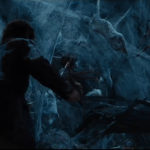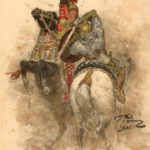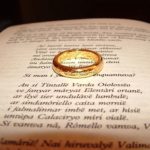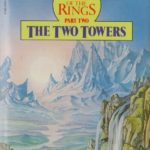The Making Of A Myth, Part 1
Speculative writers are familiar with J. R. R. Tolkien’s long essay “On Fairy Stories” and with some frequency may even quote from it. I know I have. And yet I’ve never read it. But that is changing.
With little effort, I located a copy on line, available for free download, and I’ve begun to make my way through the twenty-seven pages discussing a fairly narrow segment of speculative fiction.
Tolkien is specific. Fairy stories are certain things and definitely not others.
First they are stories about Faerie, “the realm or state in which fairies have their being,” though this realm contains much more than elves or fairies, even more than “dwarfs, witches, trolls, giants, or dragons: it holds the seas, the sun, the moon, the sky; and the earth, and all things that are in it: tree and bird, water and stone, wine and bread, and ourselves, mortal men, when we are enchanted.”
Though Tolkien obviously has in mind what he believes constitutes a fairy story, he ultimately declines to define them:
The definition of a fairy-story—what it is, or what it should be—does not, then, depend on any definition or historical account of elf or fairy, but upon the nature of Faërie: the Perilous Realm itself, and the air that blows in that country. I will not attempt to define that, nor to describe it directly. It cannot be done. Faërie cannot be caught in a net of words; for it is one of its qualities to be indescribable, though not imperceptible. It has many ingredients, but analysis will not necessarily discover the secret of the whole. . . I will say only this: a “fairy-story” is one which touches on or uses Faerie.
Instead, he elaborates on what fairy stories are not. They are not dream experiences such as The Adventures of Alice in Wonderland. They are not journey tales such as “The Voyage to Lilliput,” a rendering of an excerpt of Jonathan Swift’s Gulliver’s Travels. They are not beast fables such as “Brer Rabbit” or “The Three Little Pigs.”
At one point, however, Tolkien hints at what he believes to be key to fairy stories: “the primal desire at the heart of Faerie [is] the realization, independent of the conceiving mind, of imagined wonder.”
Imagined wonder.
I have to let that one sink in. The idea brings to mind Narnia, further up and further in, or Perelandra or Middle Earth itself. It’s beauty and awe made alive. It’s longing and hope and expectation and joy, all textured and in living color.
As to the origin of the stories themselves, Tolkien says they come from invention, inheritance, or “diffusion,” the latter two both being forms of borrowing. In the end, of course, the borrowed must of necessity spring from an original invention. But as Tolkien sees it, dissecting the origin isn’t critical. The stories themselves, even if taken from the identical original invention, will be distinct.
Hence, critiquing a work must not be based on its parts but on its whole:
In Dasent’s words I would say: “We must be satisfied with the soup that is set before us, and not desire to see the bones of the ox out of which it has been boiled.” . . . By “the soup” I mean the story as it is served up by its author or teller, and by “the bones” its sources or material—even when (by rare luck) those can be with certainty discovered. But I do not, of course, forbid criticism of the soup as soup.
So what are your thoughts? Is Tolkien too narrow in his understanding of what constitutes a fairy story? Are myths better if they are invented instead of borrowed? Do you grow weary of stories that grow out of the most common myths such as King Arthur or the Biblical (and real) Nephilim? Do you think we readers spend too much time trying to look at the “bones” instead of contenting ourselves with the “soup”?









































If you enjoy the essay, I recommend Tolkien’s letters. Though many of them are of ephemeral interest, he wrote some very long, deeply reasoned and detailed letters about mythopoesis and fantasy and eucatastrophe.
I also highly recommend for any fantasy writers Diana Glyer’s The Company They Keep, which is about Tolkien, Lewis, the Inklings, their writing and their process as individuals and in community. Her bibliography alone is a diamond mine.
Sherwood, thanks for recommending the letters. I didn’t even know they existed. And thank you for reminding me of Glyer’s book. I own a copy which I started and set down, though I really like it and am learning from it. It’s not a book to breeze through, I don’t think, but it’s high time I picked it up again.
I’m not breezing through “On Fairy Stories” either. But I’ve wanted to read it for a long time. I figured Tolkien had to have said more than just those quotes we pull out from time to time to undergird our defense of fantasy. I’ll say, so far (about a third of the way in), I am most surprised by his limited idea of fairy stories. I mean, who else would exclude Lewis Carroll’s work? 😆
Becky
As otherworldly as Carroll’s Alice stories are, I can understand excluding them because they take place in a dream world and thus are both unreal and driven by the mind’s inner workings. Tolkien makes a good point about fairy stories reinforcing the reality of the supernatural in its contact with human life, its real joys, dangers, and consequences, beyond human agency: “…the realization, independent of the conceiving mind, of imagined wonder…tales in which the fairies are not themselves illusions; behind the fantasy real wills and powers exist, independent of the minds and purposes of men.”
I actually like the fact that Tolkien excluded Carroll’s work because, unlike J. R. R., I don’t care for Alice in Wonderland. It’s too nonsensical for me, too arbitrary. So seeing that it actually is doing something different from the fantasies I love helped me make sense of my response.
I love the world of imagined wonder! To me that mirrors the longing of our hearts for what God has in store for us when we are with Him without end. But the part you quoted afterwards makes the separation between what’s going on in a character’s mind and what’s actually going on in the world in which he’s found himself. The latter is so much richer, I believe, so I’m fully on board with Tolkien on this one.
Becky
link? I’ve read it before (out of a library book) but I’d love to be able to send the web version to my Kindle to read it again in more depth…
I found it here:
http://bjorn.kiev.ua/librae/Tolkien/Tolkien_On_Fairy_Stories.htm
Still chewing through it, myself. There’s so much here!
Thanks, Kessie. I didn’t bookmark the site where I found it, so you saved me having to hunt it up. Appreciate it!! 😀
Becky
…and here’s a PDF version, including a very nice cover image:
http://brainstorm-services.com/wcu-2004/fairystories-tolkien.pdf
Thank you, Fred!
Yes! That’s the one I have (and now have again). Thank you, Fred. 😀
Becky
I’ve read this several times, and each time I get more out of it. It sounds like you haven’t gotten to the part about the use of fairy tales yet, which is a frequently quoted section, deliciously good. And he points out that adults need “recovery” far more then youth.
Right, I haven’t gotten to that section yet, but I’ve read excerpts. That’s the part that’s made this essay so popular, I think. But I’m enjoying reading the entire thing, and following his thinking on the subject from start to finish. I’ve never had the opportunity to do that before.
Becky
Rebecca: Tolkien couldn’t stand whimsy. I think you might enjoy Glyer’s book, which gets into the men’s reactions to various famous works, and their idiosyncrasies.
But some of Tolkien’s letters? Brilliant.
You’ve convinced me, Sherwood. Don’t be surprised if I use either Tolkien’s letters or Glyer’s book as fodder for future posts. 😉
Becky
Personally, I love Tolkien’s definition, but I think it’s just that: TOLKIEN’S definition. In the world of fiction, boundaries aren’t made to restrict, but to define. I love that he protects his idea of what a fairy-story is by defining what it isn’t, so when he talks about the fae, his fans know exactly where he is coming from. His own Perilous Realm was very dear to him (as are the world’s we create to us), and I can see why he would want to protect it.
With that said, I don’t think he was doing it to limit the creativity of others, as his own story, Roverandom, plays with the idea of approaching the edges of (and possibly entering) the Perilous Realm from our natural world.
Great start to a series, though. I’ll be following along for the adventure!
It’s really important to get a good defination when discussing anything like that, whether it’s fantasy or faith…I’m thinking of a small group discussion we recently had about what was faith, and the way of getting closer to God…
I agree, Andrew. He said several times in different ways that he very much liked the stories he was eliminating as “not fairy stories.” So he wasn’t disparaging them for what they were or what they accomplished. They were just different that what he wanted to talk about in the essay and he wanted it to be clear from the start.
Because I’d never read the entire essay before, this was new to me. I’m sure I would have put animal fables and dream fantasies in with fairy stories. But those are not part of Tolkien’s Perilous Realm.
I’m looking forward to learning more of his thinking through this series. The man was such a creative thinker.
Becky
“Do you grow weary of stories that grow out of the most common myths such as King Arthur or the Biblical (and real) Nephilim?”
All subjects get run into the ground. Then, every so often, someone comes along with a new, fantastic take on them. Both Tolkien and Lewis pulled various elements from myth and legend. They were similar in their thoughts on fantasy, yet Tolkien wrote the epic-style fantasy whereas Lewis more the fairy tale-style. I seem to remember Tolkien writing somewhere he didn’t like the latter. Though, honestly, it can be hard to draw a distinct line between the two types as the share so much.
Are there any fantasies or myths so original that they borrow nothing? Perhaps it is those common elements that help make fantasy what it is and make it so compelling.
Thanks for addressing the questions, DD. I think some subjects do get run into the ground. I don’t know if that happened before the internet as much as it seems to be happening now. But you’re right—when a writer can put an old, common story into a different light, the story becomes engaging all over again.
Tolkien and Lewis were clever in their use of myth, and of course subscribed to subcreation, so they brought us a new invention woven with the old good versus evil plot line.
I think you’re right about Tolkien’s opinion of the Narnia stories. I do see the difference you drew—epic myth versus fairy tale. It’s an interesting distinction.
I think all fantasies borrow from something, even the “original” ones. Those borrowed from real life, I figure. I’m writing something intended to be inventive, but I’m aware, though others might not be, of a variety of sources, some from real life and some from literature. Not the ancient myths that Tolkien and Lewis loved, though.
Becky
Becky, I enjoyed this post!
To answer your questions:
Is Tolkien too narrow in his understanding of what constitutes a fairy story?
I don’t believe he is too narrow. I really feal that most definitions have to be because definitions contain distinctives; they eliminate other things, by their nature. And he is simply having his say. Being such a belove master of fantasy, we pay close attention to him and should. But it is simply his educated view.
Are myths better if they are invented instead of borrowed?
Is it possible to create a myth. I don’t think it is. A myth is something that comes down to us in oral or written form. Some writers approximate myth-making because their work is so outstanding, but their work still isn’t the real thing.
Do you grow weary of stories that grow out of the most common myths such as King Arthur or the Biblical (and real) Nephilim?
The only thing I weary of is retakes on Robin Hood. Because of most retakes, and because he is really an anti-hero, I grit my teeth when I have to endure one.
Do you think we readers spend too much time trying to look at the “bones” instead of contenting ourselves with the “soup”?
I don’t know. We do look at the bones with things that are in our face, I believe, such as the new ABC series, ONCE UPON A TIME. There it is important to know that the soup came from the ox. Is it good ox soup, we ask. Some aspects of this series have made me applaud, such as, repeated statements that all magic has unforseen, unhappy consequences.
Maria
Maria, I started watching Once Upon a Time in search of an American suppliment to my British favorites. I really like it so far, from Henry’s cute outfits to the shifts between modern and fairy-tale world.
Galadriel, I’m enjoying it too. The shifts between modern world and fairytale world are well done, believable. All the rules of the story my mind is willing to go along with. The characterizations/actors’ portrayals, too, of Snow White’s Stepmother and Rumplestiltskin are especially … wicked. They descend to new levels of villainy. The ‘good guys’ are also great and worth watching. Glad you’re watching too!
Maria
Maria, Tolkien (and perhaps Lewis) actually was trying to create myths. Granted, they wouldn’t be stories handed down from one generation to another, but they would feel as if they had been. That’s why Tolkien went to such lengths to create a history for his world. The word for this is mythopoeia, one credited to Tolkien who apparently first used it in the 1930s.
Since I’d read scant fantasy when I first started writing my series, I thought creating your own myth was what a fantasy writer was supposed to do. 😆
And no matter how a writer feels about the Harry Potter books, I think we can agree that she created her own myth in her works, even though she utilized a wide variety of existing myth. Her end product was original.
Ah, Robin Hood. I love Robin Hood. But I haven’t read many versions or seen movies. The ones I know of legitimized his activity and criminalized the usurpers. It always came across as a good versus evil story with the good as the underdog.
I realize that I’m not tired of a lot of the stories of old are—American myths like the Lone Ranger or Zorro, not Davy Crockett, or the Last of the Mohicans. Greek myths … enjoyment may vary. Celtic myths? I’m much less familiar with them, so I can’t say I’m tired of them. Biblical accounts? Right now the Nephilim seem to be getting a work out, so I think an author has to have done a great job making their story come to life (here’s hoping that’s what Brian Godawa hs done in Primeval).
OK, when does Once Upon A Time come on? I have to check that out. A different network, maybe NBC, has a new one out too—Grimm. That one looks so dark, I don’t really care to watch it, but I suppose it would be interesting to discuss here at Spec Faith.
Thanks for your thoughtful input on these questions, Maria.
Becky
Once Upon a time airs Sundays on ABC. The currently aired episodes are on the website to be watched.
Yes, Becky, you’re right. I see: they would feel as though handed down. Right. That would take/takes an enormous amount of work, and a mind prepared for the task by the Lord.
Yes, Grimm is very grim. It doesn’t have the heart and mind of the other series. Hope you get to watch it, and catch up perhaps by watching past episodes online. Then you can give your reasoned reaction.
Maria
Enjoying the Once Upon A Time series too. Quite creative.
and by “the bones” its sources or material—even when (by rare luck) those can be with certainty discovered.
A question about bones: Does this too refer to the story behind the story? I’m writing a second novel now. It, as well as my first, expresses a personal conflict in me that no one reading it would detect (or at least, I don’t think they would). That conflict is the primary resource. So when I read the stories, I have an emotional response to both plot and characters that others wouldn’t experience. I think that must be true with a lot of novels.
With you all recommending Once Upon A Time, I’m going to have to watch it. (Ahhh, word of mouth at work. May that happen with the books we love, too!)
Bob, as I understand the “bones,” I’d say it does refer to the story behind the story, but for Tolkien, I think that meant what source you were borrowing from. When we draw upon our own life experiences, as you say, most people won’t have a clue that’s what we’ve done. I think that’s as it should be. I’ve read stories before that have seemed almost autobiographical. It’s nearly impossible to assess the story because the bones are sticking out so prominently.
(OK, total aside that has nothing to do with this discussion, but that image stirred a memory. The year after I graduated from college, a friend and I went to Mexico during the summer to take summer classes at the U. of Mexico, in their English-speaking section. One weekend we took off for the coast, just to enjoy the country. We found a little cafe along the beachfront and stopped for lunch. They served a four-course meal, starting with a salad, then fish soup. Oddly mine had a sizable bone in it. No problem. I ate around it, enjoying the atmosphere and the unique cuisine. When I finished the soup and all that remained was the bone, for some reason I turned it over. There staring up at me was a large fish eye. Definitely wish I hadn’t seen the bones behind the soup on that one!! 😆 )
Becky